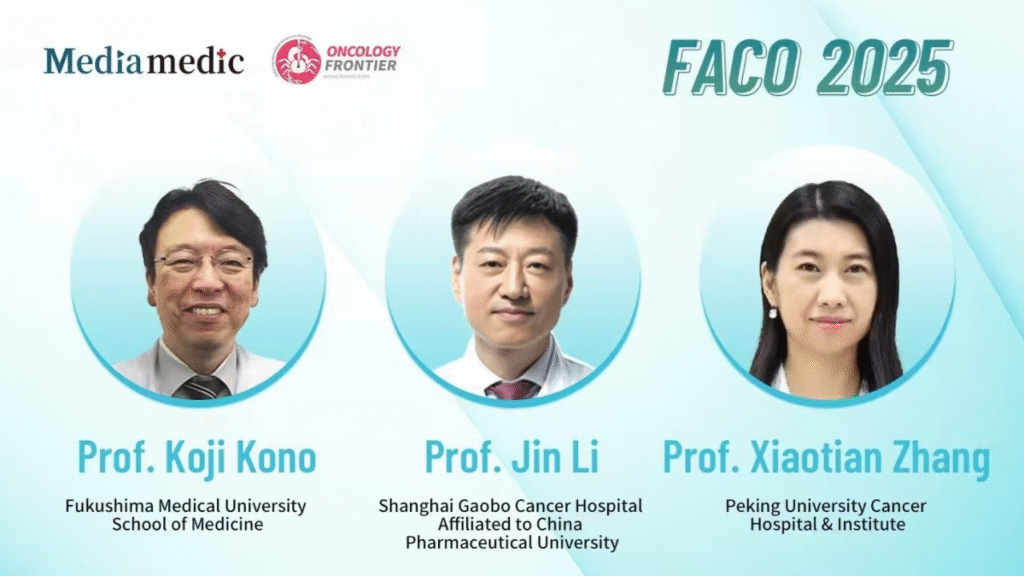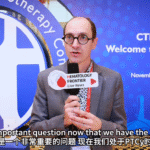
Editor’s note: China, Japan, and other Asian countries represent the regions with the highest global incidence of gastric cancer. In China, most patients are still diagnosed at advanced stages, losing the opportunity for curative surgery. Effective systemic therapies are therefore critical to improving survival. In recent years, innovative therapies—particularly antibody–drug conjugates (ADCs)—have shown promising results. Among them, the HER2-targeted ADC trastuzumab deruxtecan (T-DXd) has achieved success in key clinical studies such as DESTINY-Gastric04, and is poised to reshape treatment paradigms starting from later-line settings. Asian investigators have played an important role in these practice-changing studies.At the 13th Federation of Asian Clinical Oncology (FACO) Annual Meeting held recently in Shanghai, Oncology Frontier invited Prof. Koji Kono (Vice President of the Japanese Society of Clinical Oncology; Fukushima Medical University), Prof. Jin Li (FACO President; Shanghai Gaobo Oncology Hospital, China Pharmaceutical University), and Prof. Xiaotian Zhang (Peking University Cancer Hospital) for an in-depth round-table discussion. Together, they interpreted the latest advances in precision therapy for HER2-positive advanced gastric cancer, with a special focus on DESTINY-Gastric04, reviewed the clinical value of HER2-targeted ADCs, and discussed future directions in research and clinical practice.
Part 1. Characteristics and Current Status of HER2-Positive Gastric Cancer Management in China and Japan
Prof. Jin Li:
HER2 is an important target in precision therapy for gastric cancer, with HER2 overexpression observed in approximately 12–16% of patients. Could you share the epidemiology and current diagnostic and therapeutic status of HER2-positive gastric cancer in Japan and China based on your clinical experience?
Prof. Koji Kono:
Japan once had the world’s highest incidence of gastric cancer. However, through national H. pylori eradication programs, dietary improvements, and decades of organized screening, both incidence and mortality have decreased significantly. In 2020, Japan reported 109,700 new cases and 40,000 deaths, with an overall 5-year survival rate of around 70%. The proportion of HER2-high gastric cancer is approximately 15.6–17%.
A 2021 nationwide health insurance database analysis examined treatment patterns in advanced gastric cancer. About 14% of eligible patients received trastuzumab-based first-line therapy, achieving nearly complete coverage of those who needed it. Second-line therapy was dominated by paclitaxel plus ramucirumab (68%), consistent with guideline recommendations.
Another real-world study showed that among HER2-positive patients, the most common third-line treatment was nivolumab monotherapy, followed by irinotecan or trifluridine/tipiracil, with a median OS of 6.2 months—highlighting unmet needs and the importance of expanding access to HER2-targeted ADCs.
Prof. Xiaotian Zhang:
China is a high-incidence country for gastric cancer, with approximately 358,000 new cases and 260,000 deaths each year—roughly half of the global burden. A nationwide investigation led by Prof. Shen Lin reported the following characteristics:
- Median age at diagnosis: 63 years
- ~70% male
- 60% of tumors located in the gastric body or antrum
- Most common pathology: moderately differentiated adenocarcinoma
Thanks to expanding screening programs, early-stage cases have increased—about 35% were stage I–II with a 5-year survival rate of ~85%. However, 25% of patients were still diagnosed at stage IV, with a 5-year survival rate of only 13%, leading to an overall national 5-year survival of 33%. More comprehensive screening is urgently needed.
Approximately 13% of Chinese gastric cancer patients are HER2-positive, with higher rates among elderly men and those with liver metastasis. However, the real-world use of HER2-targeted therapy is far from optimal. The EVIDENCE study showed that trastuzumab-treated patients achieved a median PFS of 8.2 months and median OS of ~20 months, significantly better than untreated patients.
Yet 2025 data indicate that only ~5% of all gastric cancer patients received HER2-targeted therapy in the first line and ~6% in the second line. One major issue is that many hospitals do not routinely perform HER2 testing during the initial endoscopic biopsy.
Prof. Jin Li:
Is this low treatment rate partly due to financial limitations in less affluent regions?
Prof. Xiaotian Zhang:
In some cases, patients were simply not tested early enough. Some were not tested for HER2 until after surgery or during later-line treatment. We must educate endoscopists to perform HER2 testing even on small biopsy samples.
Prof. Jin Li:
Thank you both for outlining the situation. The contrast is obvious: Japan has near-universal HER2 testing, while many eligible Chinese patients miss the opportunity for targeted therapy because their HER2 status is not assessed. Significant efforts are needed to ensure more patients benefit from HER2-directed treatment.
Part 2. Interpreting the Clinical Value of Existing HER2-Targeted Therapies and ADCs
Prof. Jin Li:
HER2-targeted therapies play a central role in the continuum of care for HER2-positive gastric cancer. How do you view their clinical importance, and which regimens do you consider most impactful?
Prof. Xiaotian Zhang:
HER2 is a key oncogenic driver, so HER2 testing and targeted therapy should be recognized across all disciplines involved in gastric cancer care. The 2023 Chinese Expert Consensus on HER2 Testing in Gastric Cancer Biopsy Specimens emphasizes the importance of accurately determining HER2 expression and gene amplification.
For advanced HER2-positive gastric cancer, CSCO guidelines recommend:
- PD-L1 CPS ≥1: trastuzumab + chemotherapy + pembrolizumab
- CPS <1: trastuzumab + chemotherapy
These recommendations are based on KEYNOTE-811. Even for PD-L1–negative patients, novel therapies—such as bispecific antibody ZW25 or newer checkpoint inhibitors—should be considered, and clinical trial participation encouraged.
In 2025, CSCO recommendations were updated following DESTINY-Gastric06 and the approval of T-DXd as third-line standard therapy in China. Additionally, the domestic HER2-targeted ADC vidicitimab (RC48) was approved for HER2-intermediate (IHC2+) disease.
DESTINY-Gastric04, presented at ASCO 2025, demonstrated that second-line T-DXd significantly prolonged OS versus paclitaxel + ramucirumab. These data are expected to be incorporated into the 2026 CSCO guidelines.
Currently, HER2-positive patients have targeted options across first-, second-, and third-line therapy. Our next step is to move targeted therapy earlier into the perioperative setting. Our team recently conducted a phase II randomized trial comparing:
- Trastuzumab + XELOX
- Trastuzumab + atezolizumab + XELOX
The pCR rates were 14% vs. 38.1%, supporting neoadjuvant targeted + immune + chemotherapy combinations.
Prof. Jin Li:
Achieving pCR is clinically significant, as it may shift patients into a potentially curable category. Prof. Kono, how is HER2-targeted therapy used in Japan?
Prof. Koji Kono:
Japanese oncologists follow guidelines closely, and HER2 testing is routinely done at treatment initiation. Although HER2 expression can change over time, national insurance currently only reimburses one HER2 test—this policy should be revised.
A study presented at ASCO 2025 showed HER2 expression changes in ~42.7% of patients:
- 38.5% of initially HER2-positive patients became HER2-negative
- 7.6% of HER2-negative patients became HER2 2+/3+
Yet fewer than a quarter of patients whose HER2 expression increased actually received targeted therapy. This highlights the need for dynamic HER2 monitoring during treatment.
The 2025 Japanese Gastric Cancer Treatment Guidelines recommend:
- First line: trastuzumab + platinum + fluoropyrimidine (updated in September to include pembrolizumab for CPS ≥1)
- Second line: paclitaxel + ramucirumab
- Third line: T-DXd
- Fourth line: any previously unused therapy
Japan has extensive experience with T-DXd. DESTINY-Gastric01 showed superiority to chemotherapy in Japanese and Korean patients, leading to its approval as third-line therapy. Western studies (DESTINY-Gastric02) established T-DXd as the standard second-line therapy in the U.S. and Europe.
DESTINY-Gastric04 confirmed T-DXd’s OS benefit in Asian patients (14.7 vs. 11.4 months; HR 0.70), with higher ORR and consistent toxicity. Japan is expected to approve second-line T-DXd soon.
Prof. Jin Li:
If a patient develops resistance to trastuzumab, would you re-biopsy to confirm continued HER2 positivity?
Prof. Koji Kono:
Ideally, yes. But in practice, most clinicians rely on the initial HER2 result. This gap needs to be addressed.
Prof. Jin Li:
Loss of HER2 expression may reduce responsiveness to ADCs. In China, repeat biopsies before T-DXd are encouraged. Currently, T-DXd is approved only for third-line therapy in both China and Japan, while Western countries already use it in the second line. With strong Asian data—including 20% Chinese enrollment in DESTINY-Gastric04—we hope for rapid approval of second-line T-DXd in China.
Part 3. Future Perspectives on ADCs for HER2-Positive Gastric Cancer
Prof. Jin Li:
T-DXd and other ADCs have reshaped the treatment landscape. Some ongoing trials are exploring combinations with PD-1/L1 inhibitors in the first-line setting. How do you see ADCs influencing future diagnostics and therapy?
Prof. Koji Kono:
T-DXd is the first ADC developed in Japan for HER2-positive gastric cancer, marking the beginning of the ADC era. Future directions may include:
- Combinations with PD-1/L1 inhibitors
- Combinations with monoclonal antibodies or multitarget small molecules
- Identification of biomarkers to predict benefit
These efforts will further optimize treatment.
Prof. Xiaotian Zhang:
ADCs like T-DXd will transform not only treatment but also diagnostic workflows, emphasizing real-time HER2 monitoring before, during, and after therapy. ADC research in gastric cancer now spans all treatment lines, mirroring the evolution seen in breast cancer.
With T-DXd already achieving positive results in neoadjuvant and adjuvant breast cancer trials, gastric cancer may similarly benefit from earlier intervention. Future progress will integrate ADCs, monoclonal antibodies, bispecific antibodies, and AI-enhanced clinical trial design.
Prof. Jin Li:
Thank you to Oncology Frontier for supporting this dialogue. With the strong efficacy of T-DXd, we hope to bring it into first-line therapy and explore combinations with immunotherapy or other targeted agents to further personalize treatment. Ultimately, our goal is to offer more effective HER2-directed strategies to all eligible patients.
Reference:
- Matsusaka S, Nashimoto A, Nishikawa K, et al. Clinicopathological factors associated with HER2 status in gastric cancer: results from a prospective multicenter observational cohort study in a Japanese population (JFMC44-1101). Gastric Cancer. 2016;19(3):839-851. doi:10.1007/s10120-015-0518-8
- Oono Y, Kuwata T, Takashima K, et al. Clinicopathological features and endoscopic findings of HER2-positive gastric cancer. Surg Endosc. 2018;32(9):3964-3971. doi:10.1007/s00464-018-6138-8
- Komatsu Y, Hironaka S, Tanizawa Y, Cai Z, Piao Y, Boku N. Treatment Pattern for Advanced Gastric Cancer in Japan and Factors Associated with Sequential Treatment: A Retrospective Administrative Claims Database Study. Adv Ther. 2022;39(1):296-313. doi:10.1007/s12325-021-01931-3
- Sakai D, Omori T, Fumita S, et al. Real-world effectiveness of third- or later-line treatment in Japanese patients with HER2-positive, unresectable, recurrent or metastatic gastric cancer: a retrospective observational study. Int J Clin Oncol. 2022;27(7):1154-1163. doi:10.1007/s10147-022-02162-4
- Chen Y, Jia K, Xie Y, et al. The current landscape of gastric cancer and gastroesophageal junction cancer diagnosis and treatment in China: a comprehensive nationwide cohort analysis. J Hematol Oncol. 2025;18(1):42. Published 2025 Apr 15. doi:10.1186/s13045-025-01698-y
- Qin S, Ji J, Xu RH, et al. Treatment Patterns and Outcomes in Chinese Patients with Gastric Cancer by HER2 Status: A Noninterventional Registry Study (EVIDENCE). Oncologist. 2021;26(9):e1567-e1580. doi:10.1002/onco.13826
- Peng Z, Chen P, Lu J, et al. Trastuzumab deruxtecan in patients from China with previously treated human epidermal growth factor receptor 2-positive locally advanced/metastatic gastric or gastroesophageal junction adenocarcinoma (DESTINY-Gastric06): results from a single-arm, multicenter, phase 2 trial. EClinicalMedicine. 2025;87:103404. Published 2025 Aug 11. doi:10.1016/j.eclinm.2025.103404
- Shitara K, Van Cutsem E, Gümüş M, et al. Trastuzumab Deruxtecan or Ramucirumab plus Paclitaxel in Gastric Cancer. N Engl J Med. 2025;393(4):336-348. doi:10.1056/NEJMoa2503119
- Peng Z, Zhang X, Liang H, et al. Atezolizumab and Trastuzumab Plus Chemotherapy for ERBB2-Positive Locally Advanced Resectable Gastric Cancer: A Randomized Clinical Trial. JAMA Oncol. 2025;11(6):619-624. doi:10.1001/jamaoncol.2025.0522
- Lai M, Zhao L, Li G, et al. HER2 expression dynamics and prognostic significance in the treatment of gastric cancer. J Clin Oncol. 2025;43(16_suppl):4025. doi: 10.1200/JCO.2025.43.16_suppl.4025


